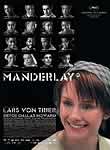 B
B Manderlay
Bryce Dallas Howard, Danny Glover, Willem Dafoe, Isaach De Bankole, Lauren Bacall; Director Lars Von Trier
BDH and her gangster father WD find a derelict plantation in Alabama in 1933. She discovers that the black workers there are all slaves. Shocked that slavery still exists in America, she confronts the dying plantation owner, Bacall. Bacall, who looks dead even alive, dies and BDH throws open the iron gates and declares all the workers free. They remain in place, ostensibly because of total passivity bred by institutionalization. She tries to teach them to value freedom, but in the end gives up in disgust and leaves.
What’s good about the movie is Von Trier’s stylistic moviemaking. It is done just like Dogville, with virtually no sets other than a kitchen table or the frame outline of a building. Actors walk around on a bare stage illuminated by spotlights, knocking on imaginary doors. I enjoy that minimalism. It really makes the acting and writing stand out. However, it was already done in Dogville, so what’s the point of doing the exact same thing again? That’s not creative. Supposedly, this movie is #2 of a trilogy, so maybe that justifies the repetition, but I found the concept less interesting than I did the first time.
What’s wrong with the movie (other than the need for editing), is the writing. None of the characters is psychologically realistic. Glover turns out to be a big time Uncle Tom, but that is inconsistent with his character as presented in the first half. And so on for other characters that show any spark of life at all. The black slaves are presented as children, if not subhumans, with no interests, values, motivation, or intelligence. So when one of them criticizes BDH for being a hypocritical, white, self-serving do-gooder, the viewer wonders where that animosity comes from. The same is true for each time any flash of emotion is shown. It is just incongruous. Von Trier mechanicallyand cynically pushes racist buttons, without justification. Glover, who is a socially responsible person, might have seen the script as a sociological commentary on the impossibility of changing centuries of culture with a proclamation of freedom. But I think the movie is shallow and malicious, even racist, and not in an ironic way. Yet here I am still typing. I begrudgingly acknowledge that it is an important movie.




No comments:
Post a Comment